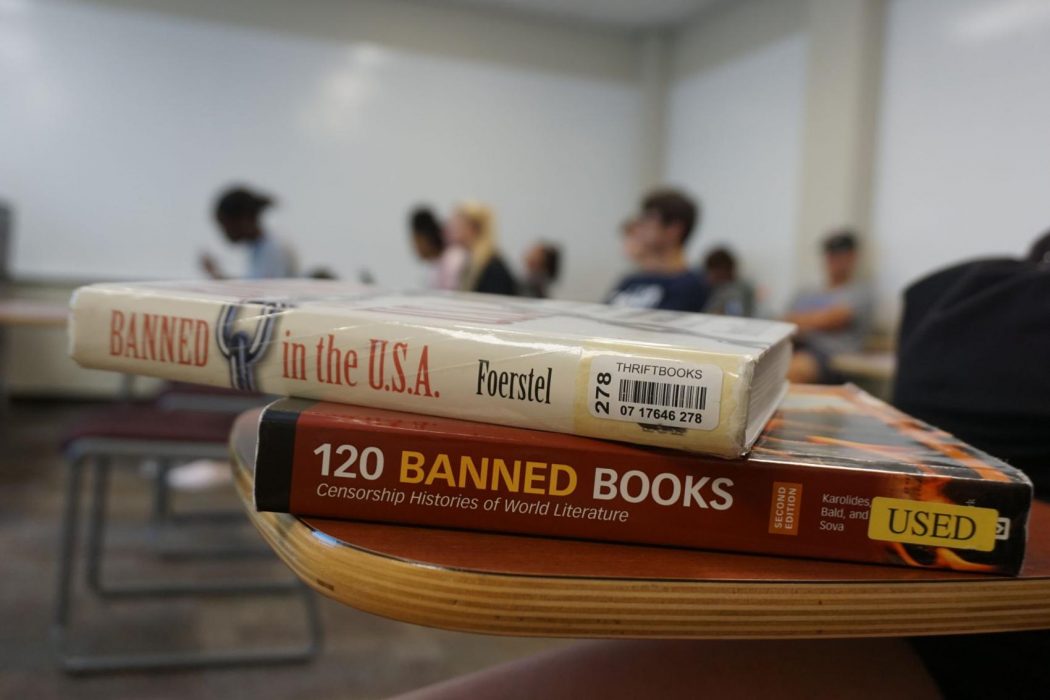In Banned Books class at College of Charleston, Salman Rushdie meets Captain Underpants
By Paul Bowers pbowers@postandcourier.com
Sep 26, 2018
Click here to read the article
Judy Blume books, Captain Underpants and Harry Potter were beloved literary fixtures in Madz Maher’s young reading life. She never knew some United States schools had banned them — until she started taking the Banned Books course at the College of Charleston this fall.
“I understood other countries had a lot of issues with banning books, but it’s weird to think about it in the U.S.,” Maher said.
Maher is taking the Banned Books class with instructor Marjory Wentworth, South Carolina’s poet laureate, this semester. As her class will discuss, the College of Charleston itself served as a battlefield in a full-blown culture war, and not too long ago. One text included on the course syllabus is “Fun Home,” Alison Bechdel’s graphic novel and lesbian coming-of-age story that drew the ire of Christian conservative lawmakers when the college assigned it to freshmen in 2014.
Another assigned reading is “The Hate U Give,” an award-winning young-adult novel by Angie Thomas. When Wando High in Mount Pleasant included it on a list of summer reading options for rising freshmen this year, the local Fraternal Order of Police lodge claimed the book was “almost an indoctrination of distrust of police” because it focused on the police shooting of an unarmed black teenager. The school kept the book on the reading list.
Outside of Wentworth’s class, “The Hate U Give” has been widely distributed on campus. The College of Charleston chose the book as its College Reads! selection for the freshman class this year and will host author Angie Thomas at the Sottile Theatre on Jan. 14, 2019. The book, which is being adapted into a movie, made the American Library Association’s list of the Top 10 Challenged Books of 2017.
While the course covers U.S. censorship and local controversies, its scope also includes books banned in other countries for religious, political, social or sexual reasons.
+1
Marjory Wentworth teaching Banned Books at CofC
Buy Now
Marjory Wentworth leads a class discussion during her Banned Books course at the College of Charleston on Wed. Sept. 29, 2018. Paul Bowers/Staff
“It’s really important to me that we do it in an international way because we can’t equate a fatwa against Salman Rushdie with a school system that won’t put your book in a library,” Wentworth said.
Wentworth herself is no stranger to censorship battles, albeit on a small scale. When she wrote a poem titled “One River, One Boat” for then-Gov. Nikki Haley’s second inauguration in 2015, state officials cut it from the program, claiming the two-minute poem did not fit within time constraints. Others suspected it had more to do with the poem’s mentions of slavery and racial injustice and the Confederate battle flag then flying on Statehouse grounds.
The public snubbing catapulted her poem to national prominence. When National Public Radio called for an interview, she had to call them back — because she was in the middle of teaching a Banned Books class at the college.
The poem’s prominence fits a familiar pattern, Wentworth said. When a piece of writing is scorned by the authorities, it often gains a wider attention.
“With my poem, are you kidding me? The people at the governor’s inauguration would have heard it. That’s it,” Wentworth said. “That poem, I don’t even know how many places that poem was re-published. So I had a much larger audience.”
An Abridged History of Book Bans
Parents, politicians and activists have been trying to keep certain books out of the hands of students for decades in the U.S. South Carolina is no exception. Here is a (heavily abridged) timeline of book challenges, bans\ and censorship in the Palmetto State.
Sources: American Library Association, Los Angeles Times, News and Courier archives, Aiken Standard, Smithsonian National Postal Museum


